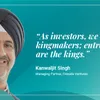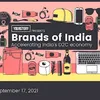Playbook for building iconic D2C brands of India by Kanwaljit Singh
Fireside Ventures Managing Partner and Co-founder Kanwaljit Singh talks about the making of iconic D2C brands with Shradha Sharma at YourStory’s Brands of India kickoff event.
It is not everyday that a live audience holds a guest speaker captive with their unending questions. But when they do, there can be no doubt the speaker is someone like Kanwaljit Singh.
In an unfiltered conversation with YourStory Founder and CEO Shradha Sharma, Kanwaljit Singh shared his playbook for building iconic direct-to-consumer (D2C) brands of India and detailed out what young startups and entrepreneurs with limited resources should do to make their D2C brands stand out.
As managing partner and co-founder of , he has been investing in consumer brands way before D2C brands became a buzzword. With his career encompassing large Fast Moving Consumer Goods (FMCG) brands such as Unilever, he brings to the table a unique understanding of the D2C world.
“This [D2C] is such an underpenetrated market with billions of consumers to cater to. In comparison to other countries, India is not even scratching the surface yet,” Kanwaljit tells YourStory founder and CEO Shradha Sharma in a live online conversation (that went on for more than an hour) to kick off the Brands of India event scheduled for September 17.

Fireside Ventures' Kanwaljit Singh details out his D2C brand-building playbook in a live conversation with YourStory Founder & CEO Shradha Sharma
In 2019, Fireside Ventures, a seed and early-stage focussed micro VC fund, set up an ambitious target — to build 25 iconic consumer brands over the next 15 years and take its companies to Rs 1,000 crore in revenue, including a few 'unicorns' in the next decade.
Two years down the line, many of its portfolio companies are already paving their path to global markets, with the likes of Mamaearth having crossed Rs 300 crore in revenue for the financial year 2020-21. Some of its other portfolio brands such as Bombay Shaving Company, boAt Lifestyle, Design Cafe, FableStreet, Slurrp Farm, and Vahdam Teas are also gaining popularity among consumers both locally and in international markets.
Citing the key categories he is excited about in the D2C space, Kanwaljit adds, “I started out with the food and beverage space. Then we started looking at personal care and beauty that emerged as a mega category. Now we are finding wellness as a category is something that will really grow, considering the strong consciousness towards personal wellness goals post COVID,” he adds.
Kanwaljit remains bullish on the D2C space in India as he expects a surge in entrepreneurial activity over the next few years.
“Everyone will have a place in the sun and that’s the exciting part,” he says, alluding to the untapped opportunities for new brands and D2C startups to grow and scale up.
Here are some key learnings that D2C startups and brands can imbibe from the brand-building playbook shared by Kanwaljit:
- Track evolving customer needs/behaviour
- Ensure product-market fit
- Understand if your D2C brand is venture-ready
- Choose the right investors
- Create an impact with a unique brand positioning
Track evolving consumer needs/behavior
Consumer behaviour and the spending mindset have widely shifted over the years. . Although urban millennials continue to dominate the customer segment, COVID has stretched those boundaries.
As Kanwaljit explains, older age groups — the new target audience of 50-plus called ‘Silvers’— are adopting digital channels of buying. Brands can offer them personalised products.
Another opportunity is the Tier II/Tier III ‘Bharat’ consumer category exhibiting a desire to consume better and branded products. Global brands coming out of India is yet another emerging space.
Ensure product-market fit
Although the challenges and opportunities have not changed for D2C brands, the surrounding ecosystem has become more data-driven.
“Even if you are starting through an ecommerce marketplace, you can get a lot of feedback instantly. A lot of brands (like Mamaearth, Vahdam Teas) started like this and then gradually shifted to the second layer that is D2C,” Kanwaljit adds.
Going to the D2C layer further allows brands to understand their consumer in a deeper sense. He also stresses that both ecommerce and D2C can coexist. But what’s more important is that one should not ignore the brand.
“How much do you engage the consumer through your conversations, content, influencers, blogs, and more will create a differentiation here. The fact that you bought it from Mamaearth and not from somebody else has to do more with just a great product and the price. It has to do with the brand and your relation with the brand,” he adds.
Understand if your D2C brand is venture-ready
Kanwaljit shares that Fireside Ventures usually comes into the picture when the entrepreneur has already done the heavy lifting, and is churning revenues somewhere around Rs 20-40 lakh per month.
“Our role here is to help the entrepreneurs take this revenue further to Rs 5-10 crore per month. The game is really about establishing that product-market fit and consumer love. Only then you will find the kind of institutional investors and VCs looking to fund or co-invest in D2C,” he adds.
He also believes that not all D2C startups need to raise venture capital.
“Raising a limited amount of money, having the right product-market fit, and only raising what you need, in my opinion, is the most prudent strategy. But then, there will be companies, bridging megatrends in categories, which will require early cash flow to build a sustainable business model and previous rules may not apply to them. As an entrepreneur, you have to decide how fast and how far you want to grow and it's not necessary that every company should be venture-funded,” he adds.
Choose the right investors
Most entrepreneurs find it difficult to do due diligence when a huge sum of money is ready to flow in. However, Kanwaljit suggests that there are different ways in which entrepreneurs should assess prospective investors.
Some of these points include:
- Talk to other entrepreneurs in which the investors have invested
- The investors should allow the entrepreneur to do the heavy lifting
- The investors should be willing to share guidance on avoiding mistakes
- Assess what value the investors are bringing to the table as partners other than funding
- Assess if in time of need, you can go to them and seek advice without worrying about any repercussion
Create an impact with a unique brand positioning
At an early stage, startups have limited resources. Thus, it would be wise if the entrepreneurs focus on building one brand and not a house of brands.
“For a startup company, you should focus on where the white space is. For instance, can you find a sweet spot where you say that I am still an organic/Ayurveda product but I can demonstrate the impact, then that becomes your differentiating factor,” he adds.
Here’s some additional advice from Kanwaljit for entrepreneurs.
- Design the brand with a specific focus/hook for the customer
- Portray your brand with clarity and authenticity of communication
- Put more effort in defining that brand proposition
- Connect with the consumer and continue building that trust factor and emotional quotient. The deep personal connection that consumers build with a brand trumps everything.
Watch the full conversation here:
[With inputs from Dipti Nair and Sanhati Banerjee]
Edited by Tenzin Pema









